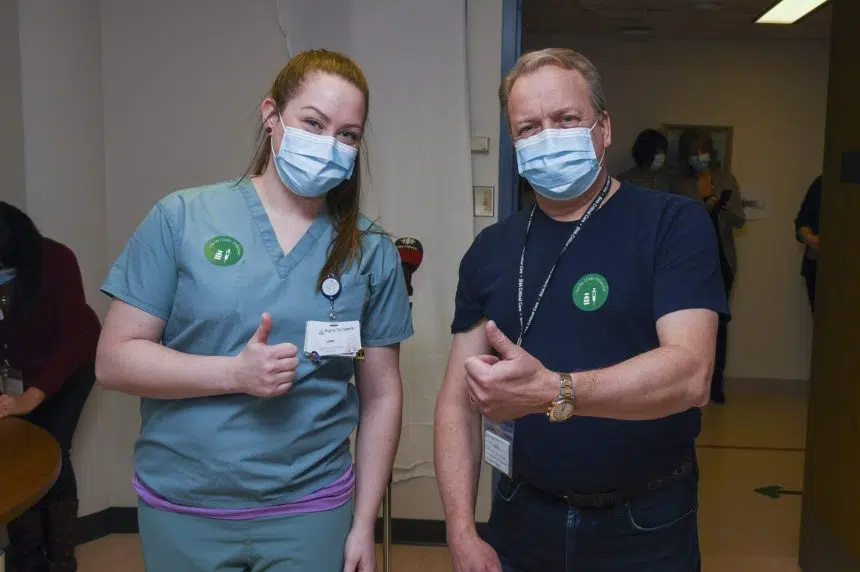The vaccination of the province of Saskatchewan is under way.
On Tuesday night, the first two people to receive a COVID-19 vaccine in the province sat down for their jabs. Dr. Jeffrey Betcher, a critical care doctor in Regina, and Leah Sawatsky, a registered nurse in a Regina ER, spoke to media Wednesday morning.
Sawatsky said she’s feeling fine and hasn’t had any side effects from the shot. She believes the vaccine is important because she sees COVID in her department every day and it doesn’t discriminate for age, gender or race.
“It’s heartbreaking when your patient looks at you and asks you if they’re going to die and you can’t give them an answer and they have to go through it alone,” said Sawatsky.
Betcher said he has seen the devastating effects the virus has had on families.
“Just that families can’t visit the people that are sick. Some people have died that haven’t been able to see their families, and their families can’t come to see them, and it’s tragic,” said Betcher.
He said at the beginning of the pandemic, he thought a vaccine would have been much further off into the future, but he thinks it’s awesome that it’s here so quickly.
Dr. Tania Diener, provincial lead for vaccinations with the Saskatchewan Health Authority (SHA), attended the first vaccinations. She said as the first shots went in, it was an emotional moment.
“You build up to it and then at last you see the vaccine and you realize it’s going into people’s arms. It is the start of a long road. It is going to take us quite a while to get through our population but it made a start, and it was just this wonderful warm feeling that there can be an end to this,” said Diener.
She said there’s still a long road ahead — it’ll take months to get the entire population vaccinated — but this is the beginning of the end of the pandemic.
The first shots are part of the pilot program to immunize 1,950 health-care workers. Diener said having these first shots and a dry run they did earlier in the week helped work out all the logistics for a vaccine with such specific and extreme temperature requirements.
“(There are) a lot of very different things that we as vaccine providers have not dealt with before, and that’s what’s making this pilot project really good, so that we can almost practise all of those things,” said Diener.
Some of the things they had to work out were the time needed to defrost the product, how many times the freezer can be opened, and how often the dry ice needed to be replaced.
“Even movement of the vaccine from the ultra freezer to where you’re gong to administer it is, let’s put it, a very careful process, and that’s one of the reasons why we cannot really move the vaccine from that ultra freezer to another site across the city,” explained Diener.
But after even just a few doses administered, Diener said they’ve learned a lot and are sharing it with people all over the province so they’ll be able to set things up and be ready for when the vaccines can be sent out.
The second doses for the pilot project are expected to arrive in the coming couple of weeks. Diener said the next steps are to figure out where in the province will be the next place to get vaccines.
When the first phase of the vaccination plan starts — expected around the end of December — people in long-term care homes will be among the first to get a shot. However, with the Pfizer vaccine that could prove difficult.
Pfizer needs to be kept at -70 C, so it’s difficult to transport past where the company drops it off.
Diener said long-term care residents might have to wait for the as-yet-unapproved Moderna vaccine, which doesn’t need to be kept as cold so it can be more easily transported.
“We’re stuck here between a rock and a hard place,” said Diener.











